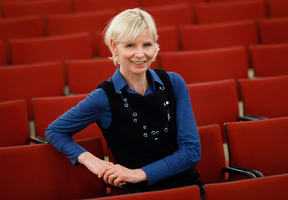
Prof. Dr. Veronika Somoza has been awarded the AGFD Fellow Award 2020
Freising, September 7, 2020
The Agricultural and Food Chemistry Division (AGFD) of the American Chemical Society (ACS) has awarded Prof. Dr. Veronika Somoza with the AGFD Fellow Award, Agricultural and Food Chemistry 2020. The prize, which has been awarded to ACS members since 1988, honors outstanding scientific contributions in the field of agricultural and food chemistry.
Prof. Dr. Veronika Somoza is engaged in the isolation and characterization as well as the bioactivity and bioavailability of food ingredients. Since November 1, 2019, she is the Director of the Leibniz Institute of Food Systems Biology at the Technical University of Munich. She succeeds Prof. Dr. Thomas Hofmann, who left the Leibniz Institute in Freising to devote himself entirely to his duties as the new President of the Technical University of Munich.
Her position at the Leibniz Institute is linked to a professorship and chair for Nutritional Systems Biology at the Research Department Nutrition and Food Sciences of the TUM School of Life Sciences Weihenstephan at the Technical University of Munich.
In addition, Prof. Somoza holds a professorship at the University of Vienna and acts as Deputy Chair of the Department of Physiological Chemistry, which she headed prior to her director’s post at the Leibniz Institute. At the University of Vienna, the former Vice Dean of the Faculty of Chemistry also led the Christian Doppler Laboratory for Bioactive Aroma Compounds.
With more than 163,000 members, ACS is the world's largest scientific society. As a non-profit organization, ACS is at the forefront of the developing global chemical enterprise and is the premier professional home for chemists, chemical engineers and related professions around the world.
Please read also:
CV of Prof. Dr. Veronika Somoza:
https://www.leibniz-lsb.de/fileadmin/doc/PDF/CV_Veronika_Somoza_June_2020.pdf
https://npc.univie.ac.at/institutsleitung/veronika-somoza/#c489221
https://npc.univie.ac.at/home/
About the ACS: https://www.acs.org/content/acs/en/about.html?sc=180808_GlobalFooter_od
About the AGFD: https://www.agfoodchem.org/
Press Contact:
Dr. Gisela Olias
Knowledge transfer, Press and Public relations
Leibniz-Institute for Food Systems Biology at the
TU Munich
Phone: +49 8161 71-2980
Email: g.olias.leibniz-lsb@tum.REMOVE-THIS.de
www.leibniz-lsb.de
Information about the Institute
The Leibniz Institute for Food Systems Biology at the Technical University of Munich (Leibniz-LSB@TUM) has a unique research profile. Its researchers combine methods of basic biomolecular research with analytical methods of bioinformatics and analytical high-performance technologies. Their goal is to decode the complex ingredient profiles from raw materials to the final food products and to elucidate their function as biological active molecules on humans. Based on their studies, the scientists develop products, which are as healthy as they are tasty. These foods will help to provide a sustainable and sufficient stream of food for future generations. In addition, the new scientific findings will be used to develop personalized nutritional concepts that, for example, help people with food intolerance without compromising quality of life and endangering their health.
The Leibniz LSB@TUM is a member of the Leibniz Association, which connects 96 independent research institutions. Their orientation ranges from the natural sciences, engineering and environmental sciences through economics, spatial and social sciences to the humanities. Leibniz Institutes devote themselves to social, economic and ecological issues. They conduct knowledge-oriented and application-oriented research, also in the overlapping Leibniz research networks, are or maintain scientific infrastructures and offer research-based services. The Leibniz Association focuses on knowledge transfer, especially with the Leibniz Research Museums. It advises and informs politics, science, business and the public. Leibniz institutions maintain close cooperation with universities - among others, in the form of the Leibniz Science Campuses, industry and other partners in Germany and abroad. They are subject to a transparent and independent review process. Due to their national significance, the federal government and the federal states jointly fund the institutes of the Leibniz Association. The Leibniz Institutes employ around 20,000 people, including 10,000 scientists. The entire budget of all the institutes is more than 1.9 billion euros.
+++ Via our Twitter channel https://twitter.com/LeibnizLSB you stay up to date +++
